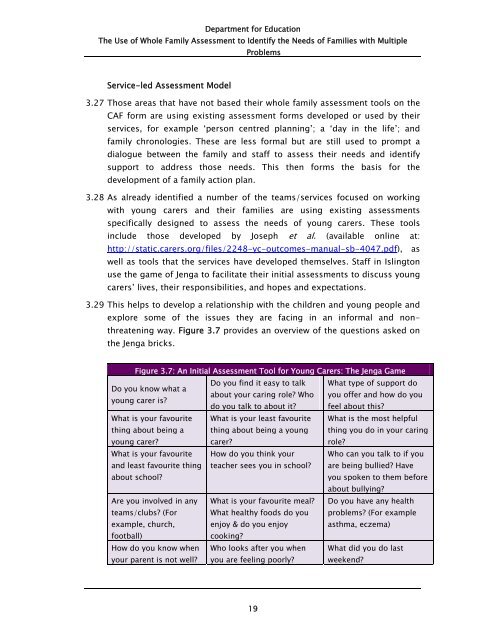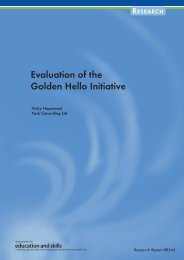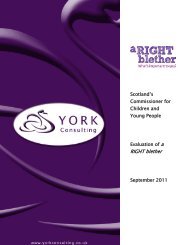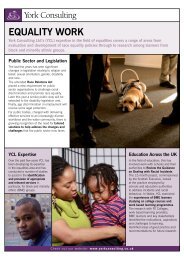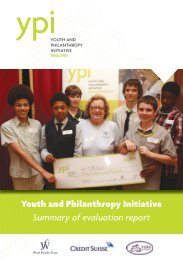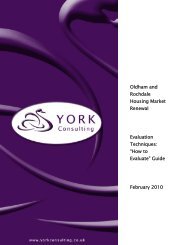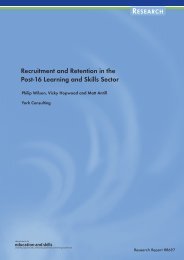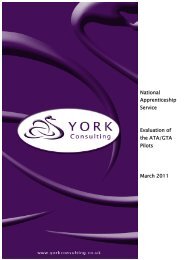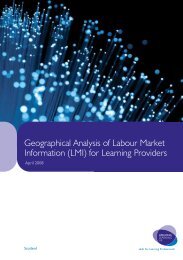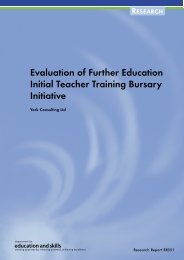The use of whole family assessment to identify the needs of families ...
The use of whole family assessment to identify the needs of families ...
The use of whole family assessment to identify the needs of families ...
Create successful ePaper yourself
Turn your PDF publications into a flip-book with our unique Google optimized e-Paper software.
Department for Education<strong>The</strong> Use <strong>of</strong> Whole Family Assessment <strong>to</strong> Identify <strong>the</strong> Needs <strong>of</strong> Families with MultipleProblemsService-led Assessment Model3.27 Those areas that have not based <strong>the</strong>ir <strong>whole</strong> <strong>family</strong> <strong>assessment</strong> <strong>to</strong>ols on <strong>the</strong>CAF form are using existing <strong>assessment</strong> forms developed or <strong>use</strong>d by <strong>the</strong>irservices, for example ‘person centred planning’; a ‘day in <strong>the</strong> life’; and<strong>family</strong> chronologies. <strong>The</strong>se are less formal but are still <strong>use</strong>d <strong>to</strong> prompt adialogue between <strong>the</strong> <strong>family</strong> and staff <strong>to</strong> assess <strong>the</strong>ir <strong>needs</strong> and <strong>identify</strong>support <strong>to</strong> address those <strong>needs</strong>. This <strong>the</strong>n forms <strong>the</strong> basis for <strong>the</strong>development <strong>of</strong> a <strong>family</strong> action plan.3.28 As already identified a number <strong>of</strong> <strong>the</strong> teams/services foc<strong>use</strong>d on workingwith young carers and <strong>the</strong>ir <strong>families</strong> are using existing <strong>assessment</strong>sspecifically designed <strong>to</strong> assess <strong>the</strong> <strong>needs</strong> <strong>of</strong> young carers. <strong>The</strong>se <strong>to</strong>olsinclude those developed by Joseph et al. (available online at:http://static.carers.org/files/2248-yc-outcomes-manual-sb-4047.pdf), aswell as <strong>to</strong>ols that <strong>the</strong> services have developed <strong>the</strong>mselves. Staff in Isling<strong>to</strong>n<strong>use</strong> <strong>the</strong> game <strong>of</strong> Jenga <strong>to</strong> facilitate <strong>the</strong>ir initial <strong>assessment</strong>s <strong>to</strong> discuss youngcarers’ lives, <strong>the</strong>ir responsibilities, and hopes and expectations.3.29 This helps <strong>to</strong> develop a relationship with <strong>the</strong> children and young people andexplore some <strong>of</strong> <strong>the</strong> issues <strong>the</strong>y are facing in an informal and nonthreateningway. Figure 3.7 provides an overview <strong>of</strong> <strong>the</strong> questions asked on<strong>the</strong> Jenga bricks.Figure 3.7: An Initial Assessment Tool for Young Carers: <strong>The</strong> Jenga GameDo you find it easy <strong>to</strong> talk What type <strong>of</strong> support doDo you know what aabout your caring role? Who you <strong>of</strong>fer and how do youyoung carer is?do you talk <strong>to</strong> about it? feel about this?What is your favouritething about being ayoung carer?What is your least favouritething about being a youngcarer?What is <strong>the</strong> most helpfulthing you do in your caringrole?What is your favouriteand least favourite thingabout school?How do you think yourteacher sees you in school?Who can you talk <strong>to</strong> if youare being bullied? Haveyou spoken <strong>to</strong> <strong>the</strong>m beforeabout bullying?Are you involved in anyteams/clubs? (Forexample, church,What is your favourite meal?What healthy foods do youenjoy & do you enjoyDo you have any healthproblems? (For exampleasthma, eczema)football)cooking?How do you know whenyour parent is not well?Who looks after you whenyou are feeling poorly?What did you do lastweekend?19


